Related Research Articles

Karl Marx was a German-born philosopher, political theorist, economist, historian, sociologist, journalist, and revolutionary socialist. His best-known works are the 1848 pamphlet The Communist Manifesto and his three-volume Das Kapital (1867–1894); the latter employs his critical approach of historical materialism in an analysis of capitalism, in the culmination of his intellectual endeavours. Marx's ideas and their subsequent development, collectively known as Marxism, have had enormous influence on modern intellectual, economic and political history.
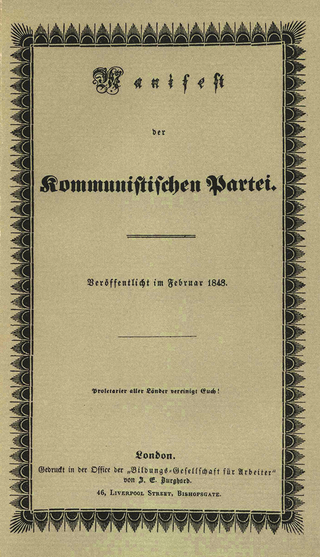
The Communist Manifesto, originally the Manifesto of the Communist Party, is a political pamphlet written by Karl Marx and Friedrich Engels, commissioned by the Communist League and originally published in London in 1848. The text is the first and most systematic attempt by Marx and Engels to codify for wide consumption the historical materialist idea that "the history of all hitherto existing society is the history of class struggles", in which social classes are defined by the relationship of people to the means of production. Published amid the Revolutions of 1848 in Europe, the manifesto remains one of the world's most influential political documents.

Friedrich Engels was a German philosopher, political theorist, historian, journalist, and revolutionary socialist. He was also a businessman and Karl Marx's lifelong friend and closest collaborator, serving as a leading authority on Marxism.

The German revolutions of 1848–1849, the opening phase of which was also called the March Revolution, were initially part of the Revolutions of 1848 that broke out in many European countries. They were a series of loosely coordinated protests and rebellions in the states of the German Confederation, including the Austrian Empire. The revolutions, which stressed pan-Germanism, liberalism and parliamentarianism, demonstrated popular discontent with the traditional, largely autocratic political structure of the thirty-nine independent states of the Confederation that inherited the German territory of the former Holy Roman Empire after its dismantlement as a result of the Napoleonic Wars. This process began in the mid-1840s.

The Forty-eighters (48ers) were Europeans who participated in or supported the Revolutions of 1848 that swept Europe. In the German Confederation, the Forty-eighters favoured unification of Germany, a more democratic government, and guarantees of human rights. Although many Americans felt very sympathetic to their cause and were deeply saddened by their defeat, many Forty-Eighters were Freethinkers who were more influenced by post-1789 republicanism in France and the anti-religious ideas of The Enlightenment than the U.S. Constitution. In particular, their traditional hostility towards tolerating religious practice or Classical Christian education, often put them at odds with American Republicanism's belief in freedom of religion and the independence of religious institutions from control by the State. Disappointed at their failure to permanently change the system of government in the German States or the Austrian Empire, and sometimes ordered by local governments to emigrate because of their involvement in the revolution, they gave up their old lives to live abroad. They emigrated to Australia, the United Kingdom, and the United States. They included Germans, Czechs, Hungarians, Italians, among many others. A large number were respected, politically active, wealthy, and well-educated, and found success in their new countries.

Gustav Struve, known as Gustav von Struve until he gave up his title, was a German surgeon, politician, lawyer and publicist, and a revolutionary during the German revolutions of 1848–1849 in Baden, Germany. He also spent over a decade in the United States and was active there as a reformer.
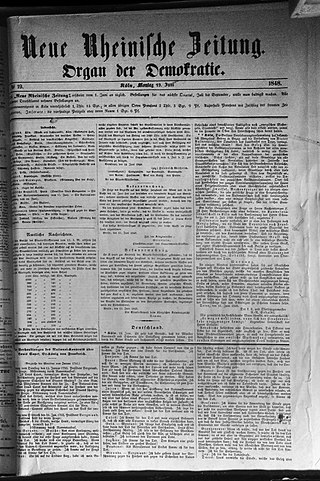
The Neue Rheinische Zeitung: Organ der Demokratie was a German daily newspaper, published by Karl Marx in Cologne between 1 June 1848 and 19 May 1849. It is recognised by historians as one of the most important dailies of the Revolutions of 1848 in Germany. The paper was regarded by its editors and readers as the successor of an earlier Cologne newspaper, the Rheinische Zeitung, also edited for a time by Karl Marx, which had been suppressed by state censorship over five years earlier.
Wilhelm Johann Carl Eduard Stieber was Otto von Bismarck's master spy and director of the Prussian Feldgendarmerie. Stieber was both an agent of domestic surveillance and an external agent. Along with Joseph Fouché, he invented modern information gathering.
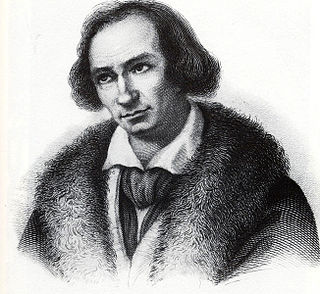
Georg Friedrich Daumer was a German poet and philosopher.
Karl Marx's thought envisages dividing the history of the State into three phases: pre-capitalist states, states in the capitalist era and the state in post-capitalist society. Complicating this is the fact that Marx's own ideas about the state changed as he grew older, differing in his early pre-communist phase, in the young Marx phase which predates the unsuccessful 1848 uprisings in Europe, and in his later work.
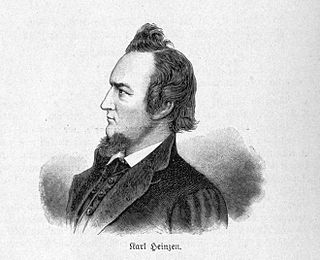
Karl Peter Heinzen was a revolutionary author who resided mainly in Germany and the United States. He was one of the German Forty-Eighters. He advocated terrorist violence against ruling dynasties and uninvolved civilian populations as a means to an end.

Der Baltimore Wecker was a daily paper published in the German language in Baltimore, Maryland. It was the object of violence in the civil unrest at Baltimore in April 1861 that produced the first bloodshed of the American Civil War.
August Hermann Ewerbeck, known by his middle name of Hermann, was a pioneer socialist political activist, writer, and translator. A physician by vocation and a German by birth, Ewerbeck is best remembered as an early political associate of Karl Marx and Friedrich Engels, as a leader of the Parisian communities of the utopian socialist organization, League of the Just, and as the translator of the French writings of Étienne Cabet and Ludwig Feuerbach into German.
Konrad Bernhard Schramm was a German socialist revolutionary and as a result a member of the Communist League. Following the suppression of the uprisings of 1848 and 1849, Schramm refugeed to London, England in 1849. He became a manager of the Neue Rheinische Zeitung: Politisch-ökonomische Revue. Schramm was also a friend and an associate of both Karl Marx and Frederick Engels.
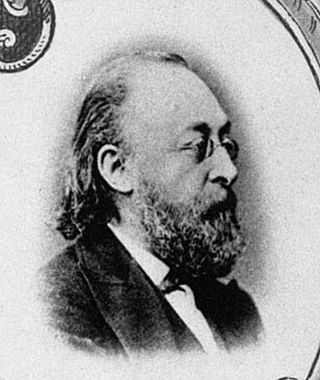
Karl Theodor Ferdinand Grün, also known by his alias Ernst von der Haide, was a German journalist, philosopher, political theorist and socialist politician. He played a prominent role in radical political movements leading up to the Revolution of 1848 and participated in the revolution. He was an associate of Heinrich Heine, Ludwig Feuerbach, Pierre-Joseph Proudhon, Karl Marx, Mikhail Bakunin and other radical political figures of the era.

Karl Marx: The Story of His Life is a 1918 book about the philosopher, economist and revolutionary Karl Marx by the German historian Franz Mehring. Considered the classical biography of Marx for a long time, the work has been translated into many languages, including Russian (1920), Dutch (1921), Swedish (1921–1922), Danish (1922), Hungarian (1925), Japanese (1930), Spanish (1932), English (1935), Hebrew (1940–1941), Slovenian (1974), Turkish (2012).

The Communist League was an international political party established on 1 June 1847 in London, England. The organisation was formed through the merger of the League of the Just, headed by Karl Schapper, and the Communist Correspondence Committee of Brussels, Belgium, in which Karl Marx and Friedrich Engels were the dominant personalities. The Communist League is regarded as the first Marxist political party and it was on behalf of this group that Marx and Engels wrote the Communist Manifesto late in 1847. The Communist League was formally disbanded in November 1852, following the Cologne Communist Trial.

Wilhelm Christian Weitling was a German tailor, inventor, radical political activist and one of the first theorists of communism. Weitling gained fame in Europe as a social theorist before he emigrated to the United States.
Permanent revolution is the strategy of a revolutionary class pursuing its own interests independently and without compromise or alliance with opposing sections of society. As a term within Marxist theory, it was first coined by Karl Marx and Friedrich Engels as early as 1850. Since then different theorists, most notably Leon Trotsky (1879–1940), have used the phrase to refer to different concepts.

Moritz Rittinghausen was a German advocate and theorist of direct democracy, an early socialist and a politician.
References
- 1 2 Gilbert, Alan (1981). Marx's politics: Communists and citizens. Rutgers University Press. p. 291. ISBN 978-0-8135-0903-7.
- ↑ Biographical note contained in the Collected Works of Karl Marx and Frederick Engels: Volume 38 (International Publishers: New York, 1982) p. 669.
- ↑ The German-language press in America, Carl Frederick Wittke, 1957. p. 101
- 1 2 Refugees of revolution: the German Forty-eighters in America, by Carl Frederick Wittke, 1952. p. 171, 269
- ↑ Class Struggles in France, 1848 to 1850, marxengels.public-archive.net
- 1 2 Germans of Louisiana, Ellen C. Merril, 2011